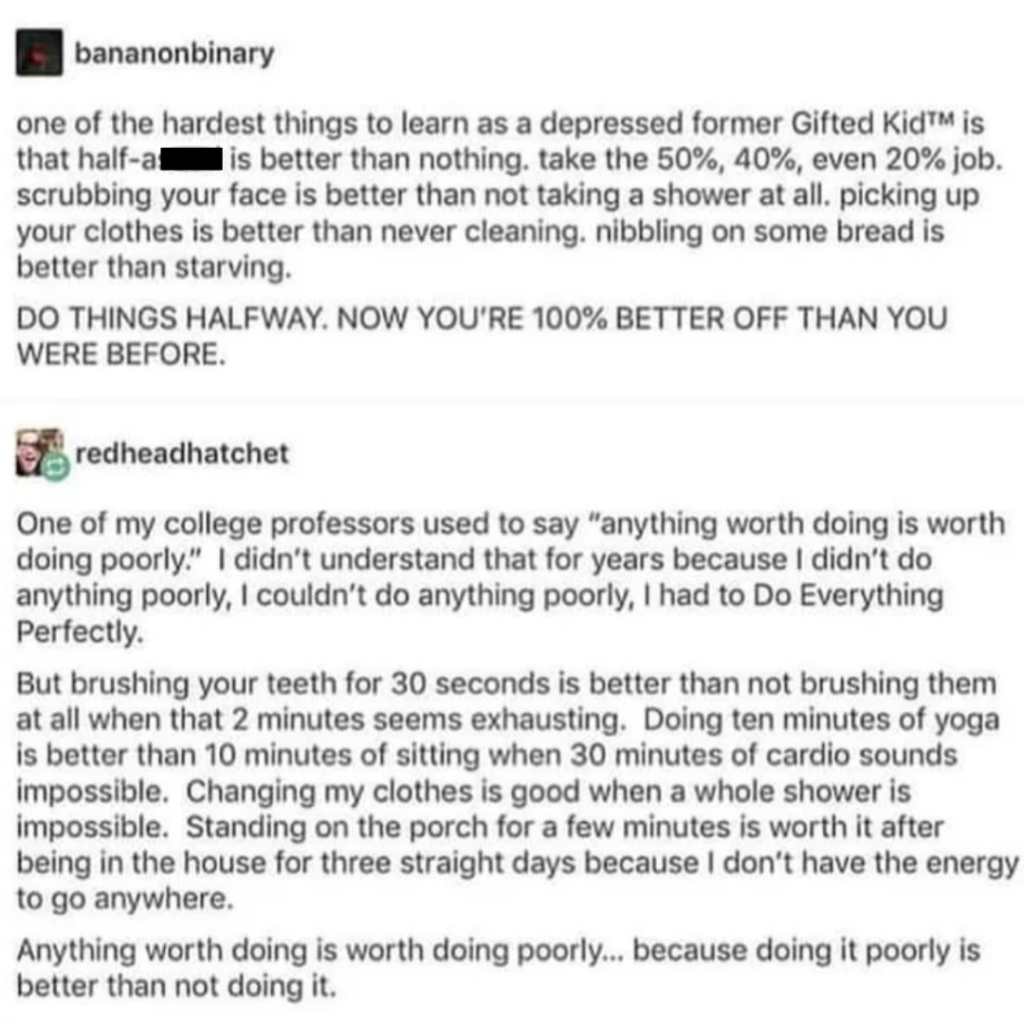One thing I’ve always struggled with is perfectionism. As someone with a lot of anxiety, I often feel like everything I do has to either be done “right” or not at all, because the fear of failing—or, at least, the fear of not meeting my own expectations—is overwhelming. This sometimes means I continuously put off tasks that I know need to get done because I’m scared that I won’t finish or do a good enough job—even if the task is something that needs to be done. Ironically, putting these things off sometimes makes me even more anxious, which lands me in a vicious cycle of anxiety.
To try and combat this, I’ve spent a lot of time trying to teach myself that it’s okay to mess things up, do something poorly, do something late, or simply fail. There’s a tumblr post that I screenshot and keep on my phone from users /bananonbinary and /redheadhatchet about how doing things partway is better than not at all and “anything worth doing is worth doing poorly” (see below.) Even though it sounds kind of silly, I look at this post a lot as a motivator for doing the things that sometimes feel difficult—if not impossible.

The sentiment seems a little strange at first, but the meaning is actually really important: not everything you do needs to be done perfectly. If there is something you want or need to do, it’s better to at least try it than to do nothing about it at all. It’s better to make a little progress, even if things aren’t fully done, than to not make progress at all. My perfectionist brain initially had a hard time accepting this idea, but attempting to embrace it has helped me in many areas of my life.
For example, I have tried to start a workout routine numerous times now, but I have failed every time. I know I would feel better about myself if I started working out, but each time I miss a day, or don’t work out as long as I should, or I’m just “bad” at a specific type of workout, I give up. I would think that since my routine is no longer perfect, it’s no longer worth following.
However, if working out is something I really want to do, I know I need to stop viewing it as all-or-nothing. Working out one day a week is better than none at all, even if my original goal was to do three days a week. Doing a workout I’m bad at and knowing I’ll improve eventually is better than never even giving myself the opportunity to improve. I have to consciously think about how it’s good to do a little bit even when I can’t do it all.
This also applies to some basic tasks in my life, too. When I’m too anxious or depressed to do something related to cleaning or self-care, I have to remember that none of those tasks need to be all-or-nothing: I can do small pieces that still keep me moving toward progress. Flossing for ten seconds is better than not brushing my teeth at all. Putting dirty dishes in the sink to soak is better than just letting them pile up. Drinking lemonade or juice instead of water is better than not hydrating at all. Bagging up the garbage, even if I don’t take it out, is better than letting it overflow. Having microwaved pizza rolls for dinner five nights in a row is better than not eating at all. At least I’m doing something to take care of myself. When I’m doing better, I can do everything in full or finish what I started. But in the meantime, the partial tasks keep me moving forward.
Lastly, I’ve applied this concept to hobbies, too. There are so many things I have wanted to do in life that I put off over and over again because I know I won’t be immediately perfect. Learning a new language. Writing a new story. Learning a new kind of art. Even just starting a new TV show can seem daunting because I don’t know everything about the show before I start. But I will never learn or do any of those things if I expect perfection out of myself the first time. I need to fail or try something new in order to learn and grow. I don’t need to know or do everything in order to start something.
This can be a difficult concept to apply to your own life—and I know, because I was resistant at first, too. However, it’s amazing how much you can accomplish when you stop viewing everything as either 0% or 100%. It’s okay to have gray areas, to fail, and to not be perfect at everything—especially the first time you do something. But even if you start adapting this idea bit by bit, it can make a difference in your own life, because a little bit of progress is better than no progress at all.
Comments
1When you catch yourself thinking that something must be done perfectly, challenge those thoughts. Ask yourself if it’s a realistic expectation and what the worst-case scenario would be if things aren’t perfect.